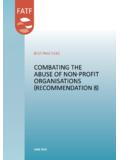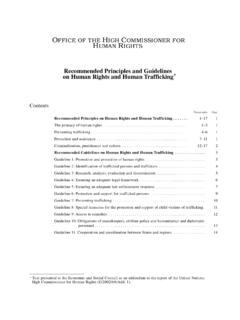Transcription of OCTOBER 2015• BEPS UPDATE No. 3 www.oecd.org …
1 Policy BriefORGANISATION FOR ECONOMIC CO-OPERATION AND DEVELOPMENTT axing multinational Enterprises BASE EROSION AND PROFIT SHIFTING (BEPS) s the issue? Globalisation has opened up opportunities for multinational enterprises (MNEs) to greatly reduce the taxes they pay. The use of legal arrangements that make profits disappear for tax purposes or allow profits to be artificially shifted to low or no-tax locations is referred to as Base Erosion and Profit Shifting (BEPS). International tax rules have not always kept up with developments in the world economy, and globalisation has increased the need for countries to cooperate to protect their sovereignty on tax matters.
2 The OECD/G20 BEPS Project began when OECD and G20 countries agreed on the need for multilateral efforts to improve tax rules, with the aim of ensuring that MNEs report profits where economic activities are carried out and value is created. OECD tax work has always sought to eliminate double taxation. An international tax system that aims to prevent double taxation is not sustainable if the same system generates double non-taxation. This is the driving principle The BEPS Project delivered its 15 final outputs in OCTOBER 2015, two years after its launch in 2013, representing the most fundamental changes to international tax rules in a century. The overall aim of the BEPS measures is to close gaps in international tax rules that allow multinational enterprises to legally but artificially shift profits to low or no-tax jurisdictions.
3 OECD and G20 countries developed the measures on an equal footing, with extensive engagement by developing countries and regional tax organisations. The focus now shifts to designing an inclusive framework for monitoring and supporting implementation, with all interested countries and jurisdictions invited to participate on an equal led OECD and G20 countries to embark on the ambitious BEPS Project. Why is this important?Revenue losses from BEPS are conservatively estimated at between USD 100 billion and 240 billion annually. This is equivalent to between 4% and 10% of global revenues from corporate income tax. Given developing countries greater reliance on such revenues, estimates of the impact on these countries, as a percentage of GDP, is even affects everyone.
4 It harms governments because it reduces their tax revenues and raises the cost of ensuring compliance. It harms people because, when some MNEs pay low or no tax, individual taxpayers must shoulder a greater share of the tax burden. And finally it harms businesses themselves: MNEs face significant reputational risk from the public focus on their tax affairs while domestic companies face an uneven playing field when competing with undermines the tax system s integrity and the trust of citizens. The goal of the BEPS Project is therefore to restore trust and ensure fair competition among all actors, while maintaining the ability to eliminate double is the impact?
5 Even before implementation gets fully underway, the BEPS measures are having an impact. Some large MNEs have announced important changes to their tax structuring, indicating that taxpayers are already changing their behaviour. Once implemented, the measures will improve the coherence of tax rules across borders, tighten substance requirements and ensure increased transparency and certainty. Improving coherence: Model rules have been developed and best practices identified to ensure that the design of domestic OCTOBER 2015 BEPS UPDATE No. 3 Gurr aOECD Secretary-General, speaking at G20 Ankara Meeting of Finance Ministers and Central Bank Governors, 5 September 2015 Let s be crystal clear: What is at stake is to restore the confidence of your people in the fairness of our tax systems.
6 See Policy BriefOCTOBER 2015 BEPS UPDATE No. 3measures takes into account what happens beyond borders. Model rules are available to eliminate Hybrid Mismatch Arrangements that allow income to go untaxed by exploiting differences in domestic tax laws; the building blocks for effective Controlled Foreign Corporation (CFC) rules have been identified; a common approach has been developed in the area of interest deductibility; and best practices have been established for mandatory disclosure regimes. Finally, the work ensures that both companies and governments will play fair, eliminating or modifying preferential regimes that are potentially harmful, and that there will be exchange information on certain rulings.
7 Tightening substance: Transfer pricing rules have been upgraded to ensure that outcomes are driven by economic reality. Recognising the difficulty in valuing intellectual property, an approach to pricing hard-to-value intangibles, such as patents and trademarks, has been designed. Simplification mechanisms have been developed for commodity transactions and low value-adding services, two areas of particular relevance for developing countries. In the area of treaty abuse, a minimum standard has been agreed to ensure that treaty benefits are only granted to those that deserve them. Finally, the definition of permanent establishment (which sets the threshold for taxation of non-residents) has been modified to better reflect business realities and avoid widespread more transparency and certainty: Indicators of the scale and economic impact of BEPS have been developed.
8 This ensures that tools are available to monitor and evaluate the effectiveness and impact of the actions taken to address BEPS. Recommendations have been formulated on the design of mandatory disclosure rules. The requirements for transfer pricing documentation have been substantially revised, with a groundbreaking template agreed for country-by-country reporting of indicators of economic activity. Countries have also agreed to exchange information on a wide range of rulings. Effective dispute resolution mechanisms have been reinforced, including the use of arbitration for interested reports on the 15 action areas of the OECD/G20 BEPS Project, published in OCTOBER 2015 and accessible at the OECD iLibrary at Love, Patrick (2013), What is BEPS and how can you stop it?
9 , 19 July, OECD (2014) taxing multinational enterprises: Base erosion and profit shifting (BEPS) II , OECD Policy Brief, Sep. ( UPDATE ), OECD (2013), Action Plan on Base Erosion and Profit Shifting, OECD Publishing. OECD (2013), Addressing Base Erosion and Profit Shifting, OECD Publishing. Saint-Amans, P. (2014), Combating BEPS and making sure we have fair tax systems: An OECD/G20 Venture , 29 Sep., paper is published under the responsibility of the Secretary-General of the OECD. The opinions expressed and the arguments employed herein do not necessarily reflect the official views of OECD member standards have been agreed to level the playing field in four areas, namely treaty shopping, country-by-country reporting, dispute resolution and harmful tax practices.
10 These are areas where countries have committed to consistent implementation to tackle cases where no action by some countries would have created negative spillovers (including adverse impacts of competitiveness) on other s next?The BEPS implementation phase will be characterised by a structured and inclusive framework that places all interested countries and jurisdictions on an equal footing. The framework will support and monitor implementation of the different measures and examine their impact over time. The package of BEPS measures aims to improve the coherence of international tax rules, reinforce their focus on economic substance and ensure a more transparent tax environment.














